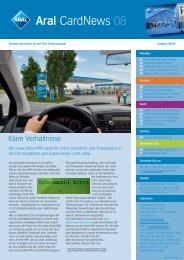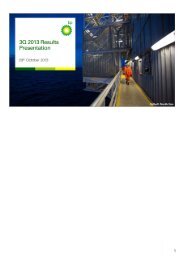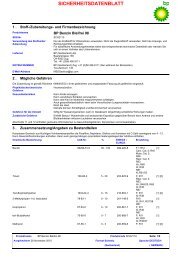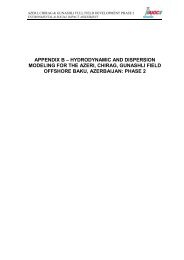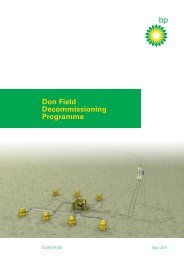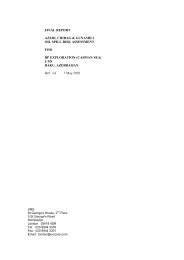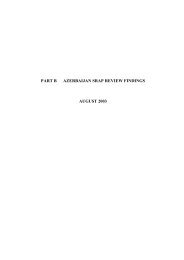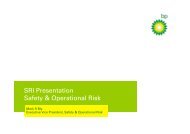BP in Angola Sustainability Report 2010 (pdf, 3860KB)
BP in Angola Sustainability Report 2010 (pdf, 3860KB)
BP in Angola Sustainability Report 2010 (pdf, 3860KB)
You also want an ePaper? Increase the reach of your titles
YUMPU automatically turns print PDFs into web optimized ePapers that Google loves.
Environmental management <strong>BP</strong> <strong>Angola</strong> places the<br />
utmost importance on manag<strong>in</strong>g the environmental impact of all<br />
its activities<br />
Manag<strong>in</strong>g our impact<br />
Our health, safety, security and environment<br />
(HSSE) policy sets out our aspirations for<br />
HSSE performance <strong>in</strong> our operations.<br />
Potential environmental impacts from our<br />
activities fall ma<strong>in</strong>ly <strong>in</strong> the follow<strong>in</strong>g areas:<br />
• Waste generation, management and<br />
disposal: hazardous and non-hazardous<br />
wastes are produced from operations at<br />
the Greater Plutonio FPSO, rigs and<br />
logistics sites.<br />
• Operational discharges: these <strong>in</strong>clude<br />
drill cutt<strong>in</strong>gs generated when we drill <strong>in</strong>to<br />
the seabed to construct a well. Mud or<br />
drill<strong>in</strong>g fluids may adhere to the cutt<strong>in</strong>gs<br />
and when disposed at sea may settle<br />
down and deposit on the seabed. The<br />
ma<strong>in</strong> process discharge from the FPSO<br />
is warm seawater with traces of biocide<br />
from the seawater cool<strong>in</strong>g system. From<br />
time to time, produced water may also<br />
be discharged, depend<strong>in</strong>g on the<br />
volumes produced and the status of the<br />
facilities.<br />
• Air emissions: these are generated<br />
ma<strong>in</strong>ly from the combustion of fuels <strong>in</strong><br />
power generation for drill<strong>in</strong>g, mar<strong>in</strong>e<br />
vessels and the FPSO, well clean-up and<br />
test<strong>in</strong>g operations and flar<strong>in</strong>g.<br />
• Accidental spills: If an <strong>in</strong>cident occurs<br />
and oil or chemicals are released to the<br />
environment, those substances have the<br />
potential to pollute the waters and land,<br />
affect<strong>in</strong>g flora and fauna as well as other<br />
users who depend on these resources.<br />
• Underwater noise generated by our<br />
activities results from vertical seismic<br />
profil<strong>in</strong>g carried out dur<strong>in</strong>g drill<strong>in</strong>g<br />
operations and regional seismic surveys.<br />
The noise <strong>in</strong>duced <strong>in</strong> the water column<br />
can affect mar<strong>in</strong>e fauna. Potential effects<br />
on mar<strong>in</strong>e mammals and turtles are of<br />
particular concern.<br />
To manage these impacts, <strong>BP</strong> <strong>Angola</strong><br />
operates an environmental management<br />
system (EMS) which meets the requirements<br />
of the <strong>in</strong>ternational standard ISO 14001:2004.<br />
It provides a systematic approach to manag<strong>in</strong>g<br />
environmental impacts and seeks to ensure<br />
that every practical step is taken to m<strong>in</strong>imize<br />
those impacts. The system is externally<br />
certified and covers the Greater Plutonio<br />
production operations, all seismic, drill<strong>in</strong>g and<br />
supply base activities <strong>in</strong> <strong>BP</strong> <strong>Angola</strong>, and<br />
onshore office facilities.<br />
Work will be done <strong>in</strong> 2011 to identify<br />
how the EMS will be <strong>in</strong>corporated with<strong>in</strong><br />
OMS. Risk reduction and cont<strong>in</strong>uous<br />
improvement are key elements of both<br />
systems.<br />
We have been develop<strong>in</strong>g a more<br />
<strong>in</strong>tegrated approach to manag<strong>in</strong>g HSE<br />
compliance, us<strong>in</strong>g a systematic approach to<br />
identify legislation, assess its applicability,<br />
exam<strong>in</strong>e controls and assign actions.<br />
Greater Plutonio FPSO plant area<br />
Health, Safety, Security and Environmental Policy<br />
Environment<br />
Everybody who works for <strong>BP</strong> <strong>Angola</strong> Region is responsible for the cont<strong>in</strong>uous improvement of<br />
our HSSE performance. We are committed to cont<strong>in</strong>ual reduction of our risks.<br />
Our goals are simply stated – no accidents, no harm to people and no damage to the<br />
environment.<br />
We will operate all our facilities <strong>in</strong> the Region <strong>in</strong> a safe and efficient manner and care for all<br />
those on our sites or those impacted by our activities. We will cont<strong>in</strong>ue to drive down the health,<br />
safety, security and environmental impact of all our operations by ma<strong>in</strong>ta<strong>in</strong><strong>in</strong>g regulatory<br />
compliance, reduc<strong>in</strong>g waste, emissions and discharges, us<strong>in</strong>g energy efficiently and assur<strong>in</strong>g a<br />
safe work environment for our workforce.<br />
We will lead our organization <strong>in</strong> the Region to:<br />
• Systematically apply the Operat<strong>in</strong>g Management System (OMS) to all our operat<strong>in</strong>g<br />
activities to cont<strong>in</strong>uously reduce risk and deliver performance improvement <strong>in</strong> a safe,<br />
compliant, and environmentally and socially responsible manner<br />
• Identify, manage and mitigate risks <strong>in</strong> all of our activities through a rigorous risk<br />
management process and <strong>in</strong>tervene when ‘emerg<strong>in</strong>g risks’ become apparent<br />
• Comply with all applicable legal requirements and company policies and procedures<br />
• Consult, listen and respond openly to our customers, employees, local stakeholders,<br />
neighbours, public <strong>in</strong>terest groups and those who work with us<br />
• Work with others – our partners, suppliers, competitors and regulators – to raise the<br />
standards of our <strong>in</strong>dustry<br />
• Openly report our performance, good and bad<br />
• Recognize those who contribute to improved HSSE performance<br />
• Cont<strong>in</strong>uously improve our performance by improv<strong>in</strong>g the leadership, capability and<br />
capacity of our organization<br />
• Susta<strong>in</strong> OMS to enable safe, compliant, responsible and reliable operations and review<br />
the effectiveness of the system at least annually<br />
Our bus<strong>in</strong>ess plans <strong>in</strong>clude measurable HSSE targets. We are all committed to meet<strong>in</strong>g them.<br />
Our OMS conta<strong>in</strong> <strong>in</strong>formation on our organization, how we set and communicate our HSSE<br />
objectives and how we monitor performance.<br />
Work<strong>in</strong>g safely and comply<strong>in</strong>g with all applicable legal requirements is a condition of<br />
employment. Staff and contractors must not tolerate deviations from legal requirements, nor the<br />
existence of unsafe acts, behaviours or conditions. All who work for and with <strong>BP</strong> are obliged and<br />
have the authority to stop work they consider unsafe or that contravenes legal requirements.<br />
Martyn Morris<br />
Regional President <strong>BP</strong> <strong>Angola</strong> Region May 2011<br />
<strong>BP</strong> <strong>in</strong> <strong>Angola</strong> Susta<strong>in</strong>ability <strong>Report</strong> <strong>2010</strong> 21




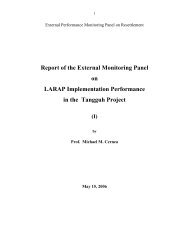
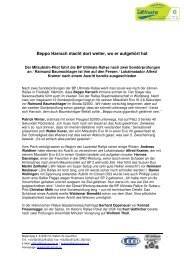
![[PDF] Deepwater Horizon: Accident Investigation Report - BP](https://img.yumpu.com/51697031/1/190x245/pdf-deepwater-horizon-accident-investigation-report-bp.jpg?quality=85)

